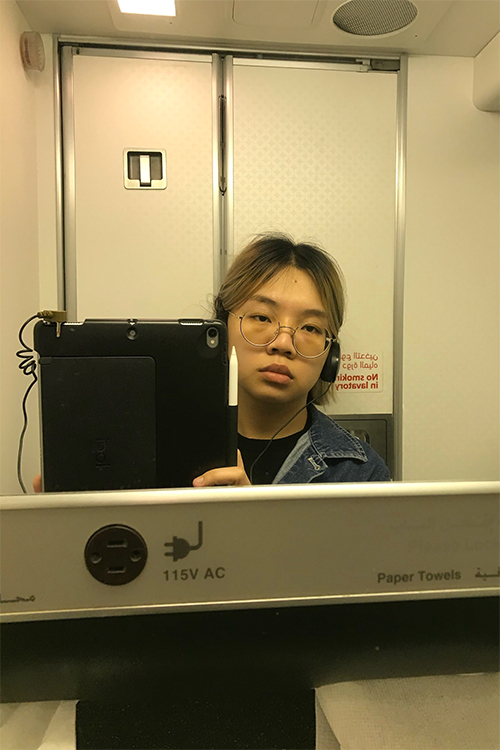While COVID-19 has disrupted the lives of students across U of T’s Faculty of Arts & Science, international students whose homes are time zones away have been especially impacted.
When the pandemic reached Toronto, A&S students from across the globe were faced with a difficult choice: stay in Toronto or go home. Sudden travel restrictions gave them little time to make a decision.
Undergraduate student and Lester B. Pearson scholar Katie Kwang chose to return home to Singapore. She describes the whirlwind days after in-person instruction was cancelled at U of T and the support she received from a faculty mentor who told her it was normal to feel anxiety during such a historically challenging period — and to give herself a break if her schoolwork wasn’t up to her usual standards.
Katie Kwang
Psychology and economics student and Victoria College member
My trip home to Singapore during Reading Week in February offered a glimpse of what was to come.
Almost everyone on my flight was wearing a mask and passengers looked over their shoulders anxiously at the sound of a cough or sneeze.
On a stopover at the Seoul airport, announcers reminded travellers in different languages not to board a plane if they were feeling sick.
The number of coronavirus cases in Singapore was still relatively low, but the tension was palpable in the island city-state where memories of SARS are still fresh.
I figured it was just a matter of time before the virus reached Toronto. When I returned, I threw a few more cans of beans and other non-perishables in my shopping cart just in case.
In March, as the numbers of cases in Canada spiked, U of T moved from in-person instruction to remote learning to promote social distancing. I originally planned to stay in Toronto to finish the semester because the 12-hour time difference in Singapore would make things tricky, to say the least.
Then one morning at 4 a.m., my phone rang. My mom in Singapore said Taiwan and other transit hubs were starting to close their borders — even to travellers en route to other destinations. I booked a flight for 6 a.m. the next day, giving me a 24-hour window to sublet my apartment and pack my life into boxes and luggage.
I combed housing groups on Facebook and messaged about 50 people before I finally found someone to sublet my downtown apartment this summer at a cut rate. I emptied my desk drawers and put the contents into a single plastic bag. I grabbed stuff out of my closet and threw it on the bed to decide what to take with me. I packed the essentials — plus my cheongsam, Chinese gowns for formal occasions. I wouldn’t get the chance to wear one in the near future, but it makes me happy just to see them hanging in my closet.

When I returned to Singapore this time — via Tokyo just days before it shut its borders — travellers had to submit to new precautions, including a “stay home notice” whereby international visitors had to remain in isolation for 14 days in government-provided lodgings. If I broke the rules, I could face harsh penalties. I spent the next two weeks in a fancy hotel in the entertainment district, where authorities called to check in on me and verify my location. Once in a while, I was asked to send a selfie to prove I hadn’t left the room.
In Singapore, they call the lockdown measures “circuit breakers.” Schools and non-essential businesses are closed. A few days ago, I spent hours — along with about a million other people — scrolling through delivery apps trying to order one last bubble tea before those shops finally shut their doors, too.
The streets are eerily quiet and empty, like the set of a post-apocalyptic movie.
As I tried to make sense of the tragedy enveloping the world, my faculty mentor and professor of political science Joe Wong provided guidance and reassurance. I emailed him because I worried about the consequences of the pandemic — not just for my own future, but for those who will be unable to lead lives of dignity under these new and terrifying circumstances. He told me it’s normal to feel anxiety and fear as we go through a challenging period in history. His advice was to forgive myself if my work during this time doesn’t always meet my usual standards. In response to my question about how the pandemic will affect the already-marginalized people of the world, he said it will make development work all the more important. The core mission stays the same, he said: to find places where our help is welcomed and soldier on.
The University's Centre for International Experience (CIE) and accessibility services helped on other fronts. CIE helped me apply for a travel bursary to pay for my emergency flight home, while staff in accessibility services helped me obtain coursework extensions to quell my anxiety.
To stay motivated while I adjust to a new, remote-learning routine, I’ve adopted the Pomodoro Technique, breaking up my studying into 20-minute intervals.
There are many aspects of my old university life that I miss: doing research in the Einstein Lab in the basement of Sidney Smith, going to the library, seeing friends. I’d love to give each of them a big bear hug right now.
Although I usually enjoy being alone, I miss people most of all.

